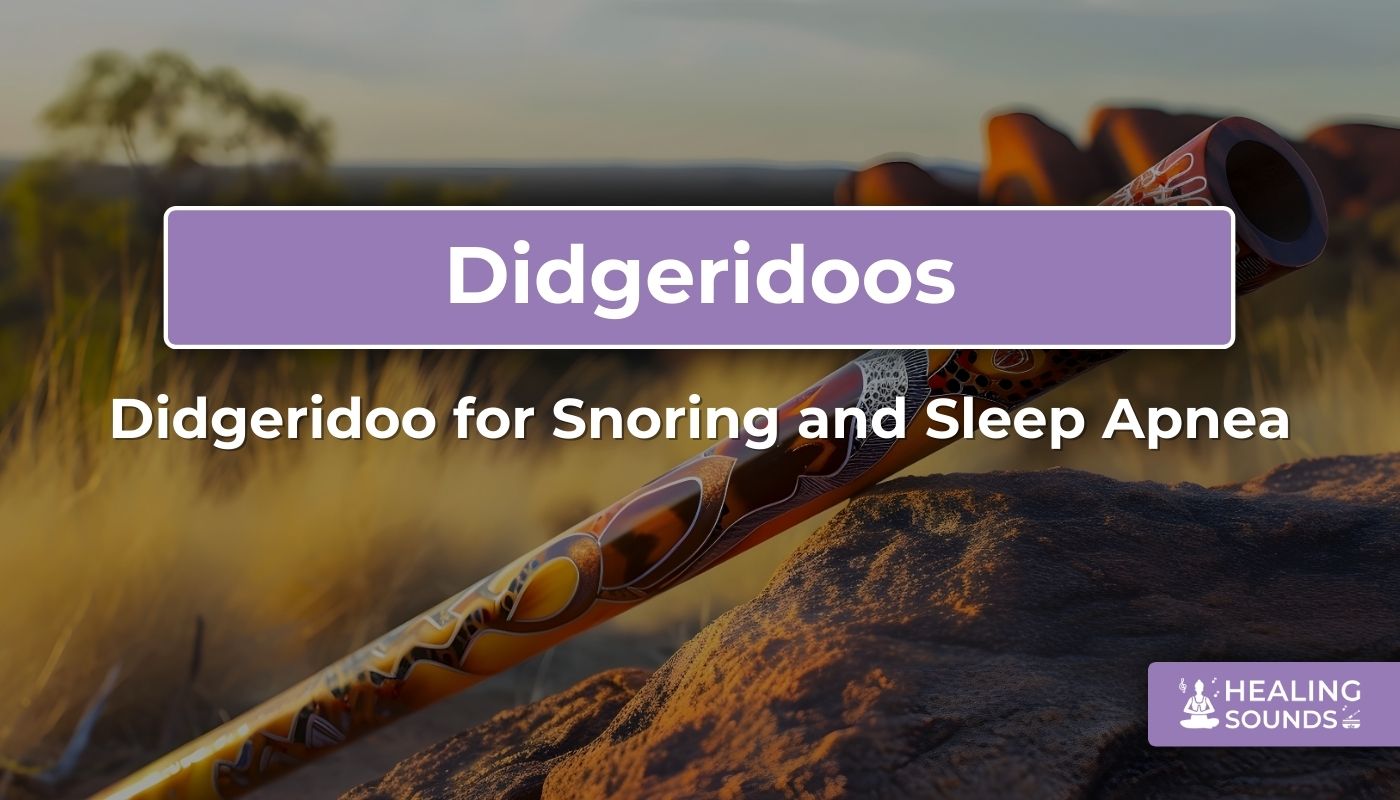The deep, resonant hum of the didgeridoo, a traditional Australian instrument, offers more than just captivating music. For those struggling with disruptive snoring and the serious health implications of sleep apnea, this ancient wind instrument presents a unique, natural therapeutic approach. If you're seeking complementary therapies beyond conventional treatments and are intrigued by the healing power of sound, you've come to the right place. This article explores the fascinating connection between playing the didgeridoo for snoring and sleep apnea, uncovering how this practice can lead to quieter nights and improved respiratory health.
What is a Didgeridoo?
Originating with the Indigenous people of Northern Australia, the didgeridoo is a wind instrument traditionally crafted from hardwood, often eucalyptus branches naturally hollowed by termites. Its distinctive drone-like sound is produced by vibrating the lips into the mouthpiece, employing a special technique called circular breathing.
While renowned for its role in cultural ceremonies and world music, the didgeridoo is increasingly recognized for its health benefits. It stands out as a unique musical instrument for sleep apnea therapy, harnessing sound and breathwork for physical well-being.
How Can Playing the Didgeridoo Help with Snoring?
Snoring often occurs when the tissues in the upper airway relax during sleep, vibrating as air passes through. Playing the didgeridoo actively engages and strengthens these very muscles. The specific techniques required, especially circular breathing, provide a targeted workout for the throat and palate.
Regular practice helps tone the muscles of the upper airways, making them less likely to collapse and vibrate during sleep. This addresses one of the primary physical causes of snoring, potentially leading to quieter, more restful nights for both the player and their household. The didgeridoo effects snoring by directly improving airway muscle tone.
Didgeridoo as a Complementary Therapy for Sleep Apnea
Obstructive Sleep Apnea (OSA) is a condition where breathing repeatedly stops and starts during sleep due to airway blockage. While CPAP machines are a common treatment, incorporating didgeridoo playing can be a valuable complementary strategy.
Scientific research supports the didgeridoo benefits sleep apnea management. A notable study published in the British Medical Journal (BMJ) found that regular didgeridoo playing significantly reduced daytime sleepiness and the severity of moderate OSA. Participants practiced an average of 25 minutes a day, 6 days a week.
Playing the didgeridoo essentially acts as a form of respiratory training. It strengthens the dilator muscles of the upper airway, which helps keep the airway open during sleep. This makes it a compelling option for those looking into alternative sleep apnea treatment with didgeridoo practices, alongside conventional medical advice. Many consider it the primary Australian instrument for sleep apnea therapy due to this specific benefit.

Didgeridoo Australian Instrument for Sound Healing
$179.90 $249.90
This high-quality didgeridoo produces rich, resonant tones ideal for sound therapy and the breathing exercises needed to strengthen airway muscles for snoring and sleep apnea relief.
Explore ProductThe Science Behind Didgeridoo Therapy for Sleep Issues
The core mechanism behind the didgeridoo's effectiveness lies in the strengthening of the upper airway muscles. Circular breathing, the technique used to produce a continuous drone, requires coordinated movements of the tongue, cheeks, and throat muscles.
This regular "exercise" increases the tone and stiffness of these muscles. Stronger airway muscles are less prone to collapsing during sleep, which is the underlying cause of both snoring and obstructive sleep apnea events. Think of it as targeted physical therapy for your airway, guided by the rhythm and demands of the instrument. For more information on sleep apnea itself, the Sleep Foundation offers comprehensive resources.
Choosing and Learning the Didgeridoo for Therapeutic Benefits
Selecting the right didgeridoo is important when your goal is therapeutic practice. Look for an instrument that feels comfortable to play and produces a resonant sound that encourages regular use.
Materials like eucalyptus, bamboo, or teak are common. While some prefer longer instruments for deeper tones, beginners might find slightly shorter ones easier to handle initially. The most crucial factor is finding an instrument that motivates you to play didgeridoo sleep apnea exercises consistently.
- Consistency is Key: Aim for around 20-30 minutes of practice most days of the week.
- Master Circular Breathing: This technique is fundamental. Many online tutorials and local instructors can help.
- Be Patient: Learning takes time. Focus on gradual improvement and enjoy the process.
- Seek Guidance: Consider lessons or workshops to learn proper technique efficiently.
While some may wonder, "How did I naturally cured my sleep apnea?", it's important to view the didgeridoo as a powerful complementary therapy. It works best when integrated into a holistic approach to health, which may include lifestyle changes and consultation with healthcare professionals, especially for moderate to severe sleep apnea.
Explore Our Didgeridoo Selection for Therapeutic Practice

Didgeridoo Australian Teak Wood Instrument
$149.90
$209.90
Made from durable teak wood, this didgeridoo offers excellent resonance, perfect for beginners starting their journey with didgeridoo therapy for snoring relief. Learn more ➔

Portable Spiral Didgeridoo - Australian Instrument
$149.90
$209.90
This compact, spiral design makes practicing airway strengthening exercises convenient anywhere, ideal for consistent sleep apnea therapy routines. Learn more ➔

Eucalyptus Didgeridoo for Yoga and Meditation
$159.90
$219.90
Crafted from traditional eucalyptus, known for deep resonance, enhancing both meditative practices and the therapeutic benefits for respiratory muscle training. Learn more ➔
Integrating Didgeridoo Practice into Your Routine
Consistency transforms practice into results. Find a time and space where you can dedicate 20-30 minutes without interruption. Many find practicing in the evening helps relax them before bed, potentially enhancing the benefits for sleep.
Focus on the quality of your practice, particularly mastering circular breathing and maintaining a steady drone. Over time, this regular engagement strengthens airway muscles, contributing to reduced snoring and better sleep apnea management.
Conclusion: A Sound Path to Better Sleep
The didgeridoo offers a unique and engaging approach to tackling snoring and complementing sleep apnea treatment. By strengthening upper airway muscles through the specific demands of playing, particularly circular breathing, individuals can experience significant improvements in sleep quality and reduced respiratory events.
This ancient Australian instrument bridges music, culture, and wellness, providing a natural way to enhance respiratory health. If you're ready to explore the therapeutic potential of the didgeridoo for snoring and sleep apnea, Healing Sounds offers a curated selection of high-quality instruments to begin your journey toward quieter nights and revitalized days.
Frequently Asked Questions about Didgeridoo for Snoring and Sleep Apnea
Yes, studies have shown that regular didgeridoo playing can help reduce the severity of moderate obstructive sleep apnea (OSA) and decrease daytime sleepiness by strengthening the muscles in the upper airway, making them less likely to collapse during sleep.
The didgeridoo is widely recognized and scientifically studied as a beneficial musical instrument for sleep apnea due to its unique requirement for circular breathing, which specifically targets and strengthens upper airway muscles involved in OSA.
The didgeridoo is the Australian instrument known for its potential therapeutic benefits for sleep apnea. Originating from Indigenous Australians, its playing technique helps strengthen airway muscles.
While some individuals significantly reduce symptoms through natural methods like weight loss, lifestyle changes, and potentially didgeridoo playing, it's crucial to understand that 'curing' sleep apnea naturally is complex and varies greatly. Always consult a healthcare professional before altering prescribed treatments. Didgeridoo playing is best viewed as a complementary therapy.
The primary musical instrument studied and recognized for helping with snoring and sleep apnea is the didgeridoo. Its unique playing technique directly exercises and strengthens the muscles of the upper airway responsible for these conditions.

